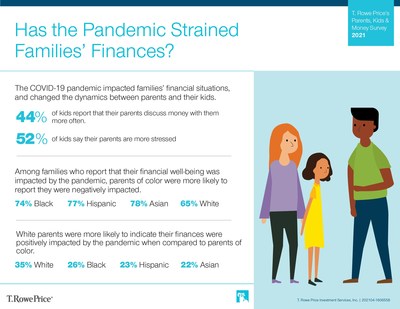T. Rowe Price: Pandemic's Impact To Financial Well-Being Compels More Parents Than Ever To Have Money Conversations With Their Kids
A study by T. Rowe Price highlights how the pandemic significantly impacted families' financial well-being, prompting more parents to discuss money matters with their children. The 13th annual Parents, Kids & Money Survey indicates 80% of parents felt a financial impact, with 67% reporting negative effects. Racial disparities were evident, as Black and Hispanic families were more likely to negatively experience financial strain and reduce savings. Despite challenges, 47% of parents engaged in weekly money conversations, emphasizing the value of financial discussions for children's future financial responsibility.
- 47% of parents reported having money conversations with their kids once a week or more in 2021, a significant increase from less than 35% in previous years.
- The Money Confident Kids program supports financial discussion, emphasizing long-term investment concepts.
- 80% of parents reported financial well-being impacted by the pandemic, with 67% indicating a negative impact.
- 29% of families reported saving less for retirement, and 27% decreased college savings.
- The percentage of families with credit card debt rose from 43% in 2020 to 57% in 2021.
- 53% of parents accessed retirement funds early, mainly due to healthcare costs.
Insights
Analyzing...
BALTIMORE, April 21, 2021 A new study from T. Rowe Price provides a look at how the coronavirus pandemic has impacted families' financial well-being, compelling more parents than ever to have conversations regarding money matters with their children. Further, the study shows how the pandemic has exacerbated existing racial inequalities, including the racial retirement savings gap.
T. Rowe Price's 13th annual Parents, Kids & Money Survey, which sampled more than 2,000 parents and their 8- to 14-year-olds, reveals insights into the pandemic's impact on different families. The findings suggest that parents feel increased urgency on the need to have money conversations with kids.
In evidence that the pandemic has furthered racial inequalities, Black, Hispanic, and Asian parents were more likely than their white counterparts to report that the pandemic had a negative impact on their financial well-being. Black and Hispanic parents found themselves almost twice as likely to reduce retirement savings versus increasing it and more than twice as likely to reduce college savings.
"It's unfortunate and concerning, albeit not that surprising, to learn from the study that the pandemic has impacted many families' financial well-being. That it has compounded the drivers of the racial wealth gap is incredibly disappointing and an indication that there is much work to be done to address this over the long term," says Jerome Clark, strategic program manager in T. Rowe Price's Multi-Asset Division and father of two.
"The one silver lining is that parents are having more conversations with kids about money. Kids often pick up on unspoken cues, and stressful situations can be turned into powerful teaching tools. Our research shows that kids who have had frequent money conversations with their parents are better positioned for financial responsibility in adulthood. T. Rowe Price's Money Confident Kids® program is particularly well suited to support such conversations given its emphasis on helping kids understand long-term investment concepts and that wealth-building is a long-term endeavor," Mr. Clark says.
T. Rowe Price's annual Parents, Kids & Money Survey has consistently shown that there is an opportunity for all parents to have more money conversations with their kids. To help parents discuss money with their kids, the firm created MoneyConfidentKids.com, which provides free online educational games, classroom lessons for educators, and tips for parents that are focused on financial concepts, such as goal-setting, spending versus saving, inflation, asset allocation, and investment diversification.
PARENTS ARE TALKING TO THEIR KIDS ABOUT MONEY MORE THAN EVER
- A record number of parents are having money conversations with their kids regularly: T. Rowe Price recommends that parents discuss money matters with their kids once a week or more. In 2021, a record number of parents followed T. Rowe Price's recommendation with
47% of parents having money conversations with their kids once a week or more. Since 2017, less than35% reported following T. Rowe Price's recommendation each year. - More money conversations were taking place:
44% of kids and43% of parents report having more money conversations since the pandemic. - Conversations were happening within families of all races: While T. Rowe Price's 2020 Parents, Kids & Money Survey, which was administered before the pandemic, found that Black families were more likely to have money conversations with their kids, the 2021 survey found no meaningful differences among races. Families of all races report having more money conversations in 2021.
FAMILIES' FINANCIAL WELL-BEING IS STRAINED BY THE PANDEMIC
- Many families report the pandemic has negatively impacted their financial well-being:
80% of parents say their financial well-being has been impacted by the pandemic, with67% of them saying the impact has been negative. However, some families (33% ) say the pandemic has had a positive impact on their financial well-being. - Some families' savings have taken a hit during the pandemic:
29% of families are saving less for retirement,27% decreased savings for college, and35% are saving less for other goals. Meanwhile,40% report decreased income and34% report increased credit card debt. However, there is a smaller percentage of parents that report increased retirement savings (23% ), college saving (20% ), saving for other goals (27% ) and income (22% ), as well as decreased credit card debt (21% ). - The percentage of families carrying credit card debt has increased: Families reporting they have credit card debt rose from
43% in 2020 to57% in 2021. - Parents were using their retirement funds early:
53% of parents responded that they have pulled funds from their retirement savings within the past year. The number one reason cited for doing so was health care costs. - More arguments related to finances were taking place:
42% of parents report having more arguments about money. - Kids perceived their parents as more stressed:
52% of kids said their parents are more stressed. - Some kids were receiving less allowance:
28% of parents reported decreasing their kids' allowance.
THE RACIAL WEALTH GAP IS EXACERBATED BY THE PANDEMIC
- Parents of color were most negatively impacted: Among families who report that their financial well-being was impacted by the pandemic, Black (
74% ), Hispanic (77% ), and Asian (78% ) parents are more likely to report that they were negatively impacted by the pandemic than white families (65% ). - Black and Hispanic parents were most likely to reduce retirement savings: Black and Hispanic parents were almost twice as likely to decrease retirement savings as they were to increase it (Black parents:
37% versus14% ; Hispanic parents:35% versus14% ). However, the percentage of white families that decreased retirement savings was comparable to the percentage of white families that increased retirement savings (28% versus26% ). This may compound the existing retirement savings gap, as only40% of Black families and40% of Hispanic families have retirement savings compared with62% of white families. - Parents of color saw similar trends with college savings: Black and Hispanic families were more than twice as likely to decrease rather than increase college savings (Black families:
35% versus11% ; Hispanic families:34% versus14% ). In contrast, the percentage of white families that decreased college savings was comparable to the percentage of white families that increased retirement savings (26% versus22% ). This trend is particularly concerning because, according to the survey responses, Black families (34% ) and Hispanic families (31% ) are significantly more likely than white families (16% ) to have student loan debt. - Parents of color were more likely to report a reduction in their income: Black (
50% ), Hispanic (51% ), and Asian (47% ) parents were more likely to report their income decreased, compared with white parents (38% ). - Increases in credit card debt were not meaningful between groups:
30% of Black,38% of Hispanic,31% of Asian, and35% of white families report increased credit card debt.
MONEY CONFIDENT KIDS is a registered trademark of T. Rowe Price Group, Inc.
ABOUT THE SURVEY
The 13th annual T. Rowe Price Parents, Kids & Money Survey, conducted by Dynata, aimed to understand the basic financial knowledge, attitudes, and behaviors of both parents of kids ages 8 to 14 and their kids ages 8 to 14. The survey was fielded from January 25, 2021, through February 5, 2021, with quotas of approximately
ABOUT T. ROWE PRICE
Founded in 1937, Baltimore-based T. Rowe Price Group, Inc. (NASDAQ-GS: TROW), is a global investment management organization with
![]() View original content to download multimedia:http://www.prnewswire.com/news-releases/t-rowe-price-pandemics-impact-to-financial-well-being-compels-more-parents-than-ever-to-have-money-conversations-with-their-kids-301273921.html
View original content to download multimedia:http://www.prnewswire.com/news-releases/t-rowe-price-pandemics-impact-to-financial-well-being-compels-more-parents-than-ever-to-have-money-conversations-with-their-kids-301273921.html
SOURCE T. Rowe Price Group, Inc.








